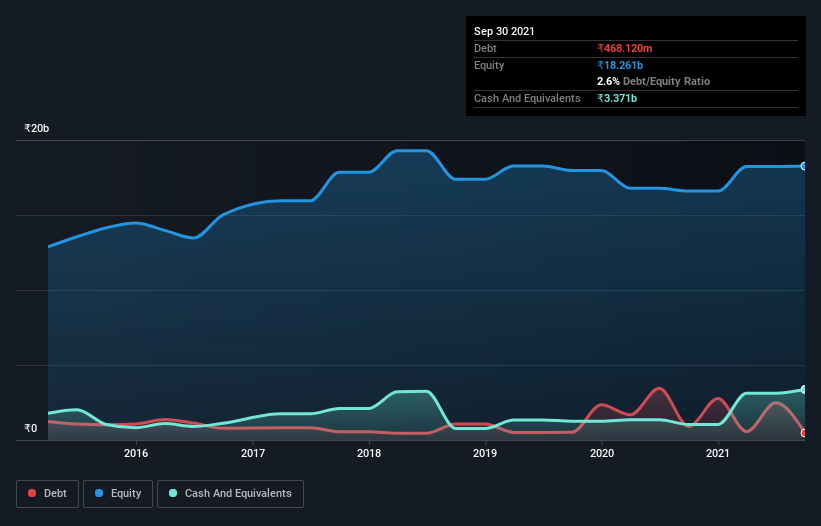
Howard Marks put it nicely when he said that, rather than worrying about share price volatility, 'The possibility of permanent loss is the risk I worry about... and every practical investor I know worries about.' When we think about how risky a company is, we always like to look at its use of debt, since debt overload can lead to ruin. We can see that D. B. Corp Limited (NSE:DBCORP) does use debt in its business. But the real question is whether this debt is making the company risky.
When Is Debt Dangerous?
Generally speaking, debt only becomes a real problem when a company can't easily pay it off, either by raising capital or with its own cash flow. If things get really bad, the lenders can take control of the business. While that is not too common, we often do see indebted companies permanently diluting shareholders because lenders force them to raise capital at a distressed price. Of course, plenty of companies use debt to fund growth, without any negative consequences. When we examine debt levels, we first consider both cash and debt levels, together.
See our latest analysis for D. B
How Much Debt Does D. B Carry?
You can click the graphic below for the historical numbers, but it shows that D. B had ₹468.1m of debt in September 2021, down from ₹902.3m, one year before. However, its balance sheet shows it holds ₹3.37b in cash, so it actually has ₹2.90b net cash.

A Look At D. B's Liabilities
According to the last reported balance sheet, D. B had liabilities of ₹3.62b due within 12 months, and liabilities of ₹2.37b due beyond 12 months. On the other hand, it had cash of ₹3.37b and ₹4.85b worth of receivables due within a year. So it actually has ₹2.24b more liquid assets than total liabilities.
This short term liquidity is a sign that D. B could probably pay off its debt with ease, as its balance sheet is far from stretched. Simply put, the fact that D. B has more cash than debt is arguably a good indication that it can manage its debt safely.
On top of that, D. B grew its EBIT by 99% over the last twelve months, and that growth will make it easier to handle its debt. There's no doubt that we learn most about debt from the balance sheet. But ultimately the future profitability of the business will decide if D. B can strengthen its balance sheet over time. So if you want to see what the professionals think, you might find this free report on analyst profit forecasts to be interesting.
But our final consideration is also important, because a company cannot pay debt with paper profits; it needs cold hard cash. D. B may have net cash on the balance sheet, but it is still interesting to look at how well the business converts its earnings before interest and tax (EBIT) to free cash flow, because that will influence both its need for, and its capacity to manage debt. Over the last three years, D. B actually produced more free cash flow than EBIT. There's nothing better than incoming cash when it comes to staying in your lenders' good graces.
Summing up
While we empathize with investors who find debt concerning, you should keep in mind that D. B has net cash of ₹2.90b, as well as more liquid assets than liabilities. The cherry on top was that in converted 111% of that EBIT to free cash flow, bringing in ₹3.5b. So is D. B's debt a risk? It doesn't seem so to us. There's no doubt that we learn most about debt from the balance sheet. But ultimately, every company can contain risks that exist outside of the balance sheet. These risks can be hard to spot. Every company has them, and we've spotted 1 warning sign for D. B you should know about.
At the end of the day, it's often better to focus on companies that are free from net debt. You can access our special list of such companies (all with a track record of profit growth). It's free.
New: Manage All Your Stock Portfolios in One Place
We've created the ultimate portfolio companion for stock investors, and it's free.
• Connect an unlimited number of Portfolios and see your total in one currency
• Be alerted to new Warning Signs or Risks via email or mobile
• Track the Fair Value of your stocks
Have feedback on this article? Concerned about the content? Get in touch with us directly. Alternatively, email editorial-team (at) simplywallst.com.
This article by Simply Wall St is general in nature. We provide commentary based on historical data and analyst forecasts only using an unbiased methodology and our articles are not intended to be financial advice. It does not constitute a recommendation to buy or sell any stock, and does not take account of your objectives, or your financial situation. We aim to bring you long-term focused analysis driven by fundamental data. Note that our analysis may not factor in the latest price-sensitive company announcements or qualitative material. Simply Wall St has no position in any stocks mentioned.
About NSEI:DBCORP
D. B
Engages in newspaper printing and publishing, radio broadcasting, and provision of news digital platforms for news and event management businesses in India and internationally.
Flawless balance sheet, undervalued and pays a dividend.
Similar Companies
Market Insights
Community Narratives




